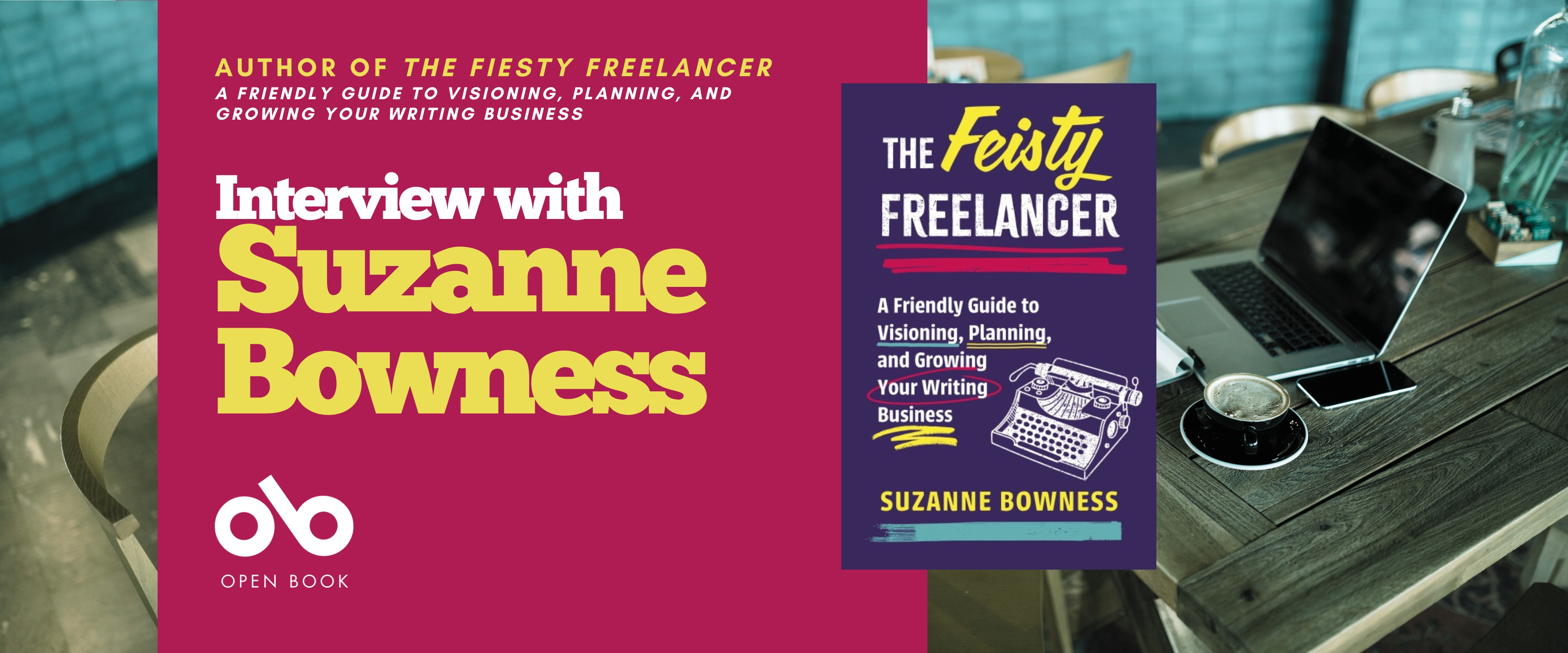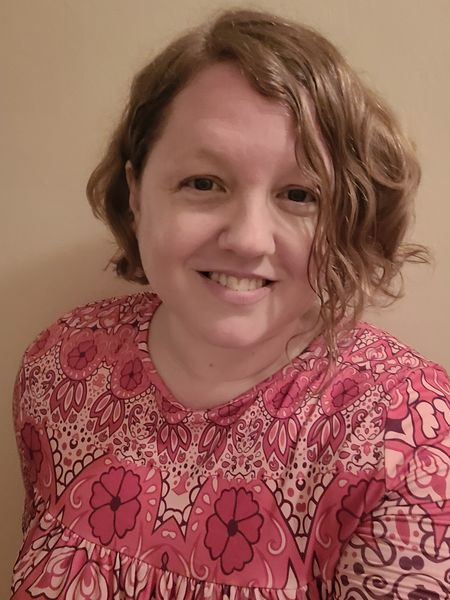Find Your Pathway to Becoming a Successful Professional Writer with The Feisty Freelancer by Suzanne Bowness
Author and freelance expert Suzanne Bowness created her first writing business over 20 years ago, and has worked independently since then. As a career path, professional writing is eminently rewarding and exciting, but it's hard to see a pathway to success for some freelancers who are new to the game, or who simply don't have the knowhow of a seasoned pro.
Luckily, Bowness has decided to share some of her vast experience with The Feisty Freelancer: A Friendly Guide to Visioning, Planning, and Growing Your Writing Business (Dundurn Press), a new nonfiction title that will serve as an invaluable guide to writers who want to make this passion and skill into their actual career.
Check out this interview with the author, and learn more about best practices in professional freelancing from someone who knows the business from top to bottom!
Open Book:
Tell us about your new book and how it came to be. What made you passionate about the subject matter you're exploring?
Suzanne Bowness:
The Feisty Freelancer (www.feistyfreelancer.com) started as an e-book a class I taught about freelancing in the Professional Writing and Communications graduate certificate at Humber College. I helped to develop and launch the program in 2015, and I felt strongly that there should be a course on freelancing given the ever-changing workplace and the need to instill some entrepreneurial thinking in students. Also by that time I myself had been freelancing for over 10 years so I knew there was lots to share on the topic.
Specifically, I knew I had lots to share. And when I didn’t see a textbook that really captured everything that I wanted to say about freelancing, I started writing it as an ebook for the course. Even at that point I knew I would like to turn it into a published book, so over the years I expanded it and by the time I pitched it to my publisher I had also started to add Q&As from other writers to expand the perspective beyond my own.
I've become a passionate freelancer, because I really enjoy this way of working. I am a pretty independent person, so I really enjoy the benefits of freelancing which I see as creating your own schedule and taking on a nice variety of projects. Freelancing has really worked for me as a lifestyle. But I've also met other people who it does not work for, so I feel like I can help people to figure out whether it's a good choice for them. I also want to help them skip some of the mistakes that I made and skip ahead to the good stuff. I describe the book in the subtitle as a friendly guide, and I’ve written the text in a tone that I hope makes the world of freelancing seem approachable, not without hard work, but something people can do with some determination.
OB:
What do you love about writing nonfiction? What are some of the strengths of the genre, in your opinion?
SB:
I actually love writing fiction as well as nonfiction, and so the things I love about non-fiction are often the elements borrowed from fiction: character, narrative, and more. In writing the Feisty Freelancer, my task was really to think about what my reader needs so this book is really more of a guide than a creative exploration, but I do try to incorporate my own story into it and give the reader a sense that they are being invited into this world.
Your CanLit News
Subscribe to Open Book’s newsletter to get local book events, literary content, writing tips, and more in your inbox
Nonfiction as a form has been my daily work for my entire career, and besides the fictional crossover elements, I also like that it allows me to uncover and share everybody's everyday stories. Things that people do with their lives, with their work and with their time can be really inspiring and interesting. I love it as a storyteller and journalist, when I'm able to find that story. I like that I am connecting with other people's passions about what they're doing, from the small business owner to a successful student. I love to extract that and to share that with the wider world, and it’s nice when you hear from a non-writer gratitude that you were really able to capture their story.
OB:
What do you need in order to write – in terms of space, food, rituals, writing instruments?
SB:
It’s ironic that being a freelancer with a potentially totally unstructured life, I actually need to impose structure to get things done. I’m a 9 to 5-er because that’s the hours most office workers keep. I take a half hour lunch break, always away from my desk, and two 15 minute breaks in the morning and afternoon. I tend to workaholism, so I try to leave my desk at 5 and then return if I need to, otherwise I would just slide into evenings at times. I try to be really deliberate with breaks and watch TV or read a book or take a walk, something totally disengage and give my mind a rest so I’m not just sitting at the kitchen table eating my lunch and still thinking about work. Immersion in some other task or world allows me to make that full breakaway that makes me feel quite refreshed when I return to my desk for the afternoon.
In terms of tools, having a dedicated desk and the privilege of a separate office is really important so that work is a place I go to, even if it’s just in my home. I do most work on my laptop, and I love having two monitors, something I just adopted a few years ago.
OB:
A lot of nonfiction prizes and anthologies have expanded to welcome more personal nonfiction as well as strictly research-based nonfiction. What do you think of this shift within the genre?
SB:
This is an interesting question, because it was something I started thinking about as I wrote the Feisty Freelancer, which I wanted to be a guide to how to be a writer and make a living at it, how to start a business. At the same time, I thought that a way to make it more friendly and approachable would be to include a lot of myself in it, so it did become a bit more personal sharing my own work story. From the beginning where I was laid off from my dream job at a magazine, to discovering that I liked the independence of freelancing, to adding teaching to my roster of skills, to pondering next steps. I started to think about why people don’t write more work memoirs, like celebrities do but what about the average story of a person building their career as a paramedic or a graphic designer and learning from their journey. One niche that I’ve written a lot about over the years is careers and work, and I would have made it an even fuller niche if there were more places to write about work. I’m always surprised that while we all spend seven or eight hours of our day at work, there aren’t a lot of public discussions about what it is to be at work.
In terms of personal nonfiction as a genre, I like it—one of my favourite genres is the memoir because it allows the reader access to the emotional journey of some events, and the storytelling gains some personal elements when seen through the lens of someone who experienced their story.
OB:
What do you do if you're feeling discouraged during the writing process? Do you have a method of coping with the difficult points in your projects?
SB:
I do get discouraged because I’m a human, but I find that paying the rent with my writing I don’t have time for writer’s block. So I’ve gotten strict with myself about shifting out of it quickly. Some tips that I pass along in the Feisty Freelancer include setting timers to give yourself a deadline for getting unstuck, and if that doesn’t work going for a short walk or other task where you can let your mind wander and your body burn off a bit of anxious energy. Cleaning the fridge or a quick dusting usually works. As opposed to my lunch break where I want to disengage, on a stuck break I want to take advantage of that back burner for my mind. If I’m really stuck and I have the time, overnight is a good break (and this is the reason why it’s good to get started on deadlines early).
Taking time off generally helps with a larger block. Ironically, you are more productive with work if you have some time to just be away from it. So if I'm having a busy week and getting a little bit discouraged, or maybe doing a lot of pitches and getting a lot of rejection, I'll take the weekend off and just try to do something different. And such that I can come back to it with a clear head and a fresher mind.
OB:
Do you remember the first moment you began to consider writing this book? Was there an inciting incident that kicked off the process for you?
SB:
As I mentioned, I started this book as an ebook in a freelancing course that I was teaching, but even more so I think a repeating inciting incident was that I used to start the course with an “ask me anything” session, where I told students that no question was too big or small, and that I suspected there were probably questions about writing or freelancing that they wanted to solve so let’s get them out of the way to start with so that today is a good day and you got your answers right off the top. Many of the questions that came up were the same year over year, relating to money, pitching, time management, and those are some of the biggest topics in the book.
__________________________
Suzanne Bowness is a writer, editor, and communications consultant. Since 2002, she has written for publications and clients through her business CodeWord Communications. Suzanne is a longstanding part-time writing teacher with a PhD in English who delights in passing advice to new writers. She lives in Campbellford, Ontario.







